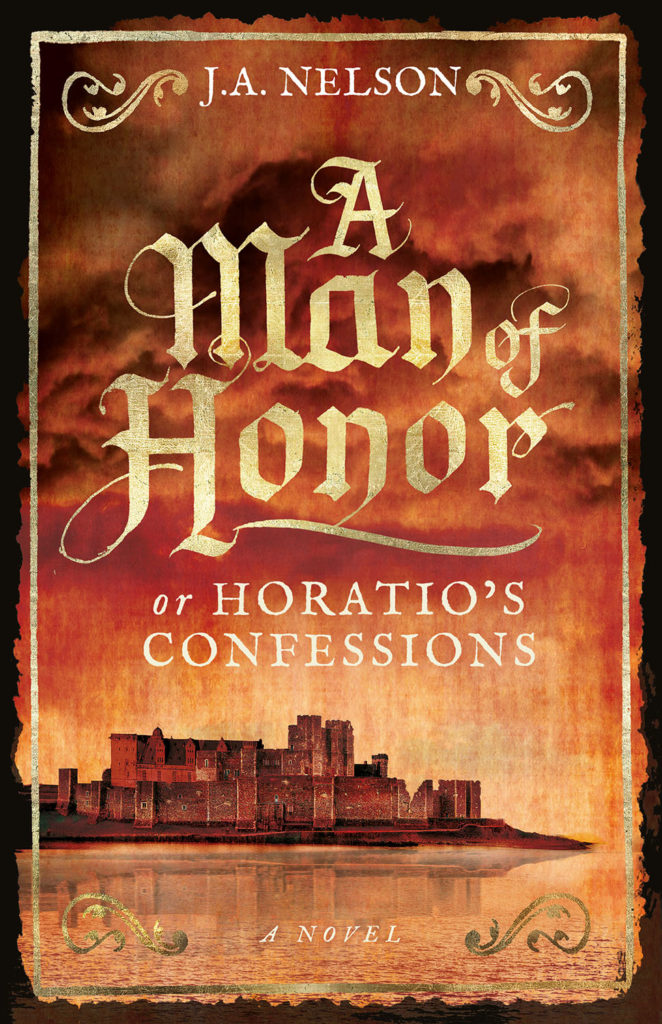A Man of Honor, or Horatio’s Confessions
 Available in paperback, ebook, and audiobook (narrated by Alex Knox)
Available in paperback, ebook, and audiobook (narrated by Alex Knox)




Kobo, Nook Audio, Walmart, Bibliotheca, Scribd, Blackwells, Gardners, Waterstones, IndieBound
And at more stores worldwide! Contact your favorite retailer or library to request.
Published by: Quill Point Press
Pages: 414
Paperback ISBN: 978-1-7333475-0-1 / ASIN 173334750X
 eBook ISBN: 978-1-7333475-1-8 / ASIN B082H68SSC
eBook ISBN: 978-1-7333475-1-8 / ASIN B082H68SSC
Audiobook ISBN: 978-1-7333475-2-5 / ASIN B0875RH3WH
Finalist, Literary Fiction
14th Annual National Indie Excellence Awards (2020)
2020 Notable Indie, Top 100
Best Indie Book Awards, Shelf Unbound
Winner of two silver medals
Best First Book, Fiction
Best Cover, Fiction
Awarded by the IBPA (2020)
Overview: A Man of Honor tells the fictional tale of how one man's oath gave birth to the legend of Hamlet.
How far would you go to keep a deathbed promise? Surrounded by the bodies of slain monarchs, a dying prince extracts a promise from his friend, Horatio: “Tell my story.” Rival kings of warring nations strive to lay claim to the throne, now vacant, but what will happen to the people who live there, at Helsingør’s Krogen Castle? How will Horatio preserve his honor and the prince’s legacy while surviving this murderous kingdom and the men who would rule it?
Despite the odds and threats against him, Horatio persists, weaving the story of his dear friend into the fabric of one of their oldest and most revered medieval texts, the Gesta Danorum. But when a nefarious Spaniard thwarts his plans, Horatio must once again risk everything to fulfill his oath. With the help of some unexpected allies in the form of Margrete, a courageous lady-in-waiting, and Lanier, a disgraced French nobleman, Horatio undertakes this perilous quest that will lead him on a journey none of them could have ever predicted, to a place none of them ever thought they would see.
And after their hard-fought journey will it all be for naught? Will Hamlet’s glory be Horatio’s downfall?
Trailer
Critic's Report, The BookLife Prize (2020) Publisher's Weekly
- Plot: Nelson’s novel reimagines the life and times of a perennially intriguing and under-explored Shakespearean character.
- Prose: Nelson’s prose effectively channels the language of Shakespeare while remaining clear and accessible to modern readers.
- Originality: Stories that draw from Shakespeare are hardly novel, but this work’s direct focus on Horatio in the aftermath of Hamlet’s death, provides a welcome degree of novelty.
- Character/Execution: A Man of Honor begins where the tragedy concludes. Nelson provides Horatio with agency and depth, while remaining living characters of the play are offered additional stage time. New characters are well integrated and the historical setting is vivid.
Rating: 4 out of 5, Clarion Reviews
With its literary flourishes and exciting scenes, A Man of Honor addresses ethical questions in fascinating ways.
Reviewed by Susan Waggoner
In J. A. Nelson’s historical novel A Man of Honor, Hamlet’s friend Horatio tells an evocative, compelling story of his own.
As Hamlet dies, he asks his friend Horatio to tell his story to all who will listen. Horatio agrees, but the commitment proves treacherous, trapping Horatio and the small kingdom of Helsingør between two violent and powerful kings, Cristiern of Denmark and Fortinbras of Norway. Both seek dominion over tiny Helsingør, and Horatio must lie to both kings to save his people and fulfill his pledge to Hamlet.
Knowledge of Shakespeare’s play is not vital; background information is woven in. Horatio narrates. He is sympathetic and earnest, a commoner who struggles to honor his pledge and who has moral qualms about the lies he tells on Hamlet’s behalf. Margrete wins Horatio’s heart, while Lanier, an itinerant aide whose wit surfaces in flourishes of dark humor, also play major roles.
When Fortinbras storms the castle and searches for King Claudius, it’s Lanier who finds the body rolled in a rug and, unfurling it, announces, “Mon seigneur, I present Claudius … He cannot receive you.” Lanier and Margrete outrank Horatio in intelligence and experience, but recognize his inner worth and save him from naïve and dangerous blunders. Supporting characters are convincing in their roles, and Reynaldo, a treacherous spy, stirs real resentment.
Setting and moods are established well; even the opening chapter conveys fresh death in all its macabre fascination. Emphasis is placed on the Scandinavian setting, conjuring a world closer in spirit to that of the Vikings than to the Elizabethans. Descriptions of blood and battle capture the flavor of Nordic sagas.
Excitement is introduced to the potentially tame story line in clever ways. Horatio decides he can prompt Fortinbras into defending Helsingør by researching facts that justify a flattering biography. No such facts exist, but when a prized account of Danish history is nearly destroyed in a fire, Horatio saves it. He decides to replace it with his own faux history praising the House of Fortinbras and incorporating details that restore Hamlet’s honor. The book, pursued by both kings, injects intrigue, danger, and a harrowing kidnapping into the story. Literary fans will recognize the book, Gesta Danorum, as one of the sources Shakespeare drew on for his play.
As Horatio, Margrete, and Lanier attempt to evade both kings, the story crescendos with a suspenseful escape by sea, though its emotional release is undone by a long addition that skips ahead six years to a second, weaker kidnapping. An epilogue set eighty-five years in the story’s future undermines the liveliness of Horatio, Margrete, and Lanier’s stories.
A Man of Honor is a literary novel featuring taut action and strong characters who address questions about the nature of integrity.
IndieReader, 4.4 (out of 5 stars)
In A MAN OF HONOR, Horatio makes a promise to the dying Hamlet to tell his story—to “dare to stand in the open and tell the truth” (2). It is this promise that that leads Horatio on an often dangerous pilgrimage to fulfill his vow and discover the reality of Hamlet’s life. On his journey, Horatio is joined by Lanier, a Frenchman, who often serves as Horatio’s teacher, as well as Margrete, and a love story emerges.
Told in first-person by Horatio, author J.A. Nelson’s novel follows in the tradition of historical fiction. Nelson creates a beautiful but terrifying sixteenth century where numerous factions struggle for power and influence. The main characters are loyal but fallible, and the reader identifies with their struggle to keep moving forward—to finish what they’ve started. Horatio is resilient, loyal, and moral in a world that is anything but these things.
Readers may be disoriented by the introduction, at the opening pages, of a crowd of characters which may make it necessary to review prior paragraphs and pages to verify who is who and what is what. This is further complicated by the opening scene of Hamlet’s death, which sometimes feels forced. In the scene, Hamlet is dying, but he’s nevertheless having a full conversation with Horatio before finally taking his last breath. Hamlet, for example “lurched and gripped” Horatio’s hand before speaking. Having pushed through the opening chapter and getting acclimated, however, the narrative takes off.
Nelson has developed a timeless story told through the voice of Horatio. He is resilient and tough yet struck by the endearing nature of Margrete, of whose care, Horatio says, “rendered me speechless. No one had ever sacrificed for me, had been my champion. For another to share my burden—that was a foreign and uncomfortable aspect” (232). A MAN OF HONOR may be set in a distant time and place, but Horatio’s search for the truth about his late friend, Hamlet, is an internal journey of discovery to which many readers will relate.
IR Verdict: Like a train, A MAN OF HONOR's narrative builds speed and takes off into an often gripping adventure of love, war, and discovery.
RECOMMENDED by the US Review
"The story of Hamlet survives, truthfully told."
Book review by Gabriella Tutino
With his dying breath, Hamlet asks his best friend Horatio to live on and tell his story, to let people know what conspired at Helsingør. Horatio swears, but before he can grieve, Fortinbras and his army invade the castle, demanding to know what happened. Horatio seizes this opportunity to tell Hamlet’s story and fulfill his duty to his dead friend, appealing to Fortinbras’ nature. However, when Horatio finds himself risking his life and his honor in his quest to tell the story of Hamlet, he becomes tangled in a grab for power for the throne of Denmark. Can Horatio survive and successfully pass down the legend of Hamlet?
Horatio is a scholar and is more or less Hamlet’s trusted sounding board during the course of Shakespeare’s original play. Rational, practical, and given to lofty ambitions of what it means to be noble and successful, Horatio is the perfect character to carry on Hamlet’s story. In this version, he is quick-witted in his thinking and his speeches, although prone to exaggerating and lying a bit to make the best out of a situation. Horatio is accompanied by Margrete, a lady-in-waiting, and Lanier, one of Fortinbras’ men, in his duty and adventure to preserve Hamlet’s tale as well as the Gesta Danorum, Denmark’s cultural prize of history and folklore.
Thrown in the mix as an obstacle to Horatio’s task is the looming war between Fortinbras and Cristiern, a king who also has a claim on Denmark as the rightful heir to the throne. The two foes are similar in that both believe their reign will be good insofar as uniting Denmark, and Horatio is forced to blur his alliances so as to keep his mission alive. This political drama between the two men also centers the Gesta Danorum and Horatio’s role as a scribe. Since the book itself is a key part of the Danes’ culture, updating it to reflect the success of one of the conquerors is crucial. As a scholar, Horatio realizes the importance and weight of such a task, and finding a way to insert Hamlet’s story into the Gesta Danorum becomes a part of his mission. It is also a nod to the actual Gesta Danorum text, which includes the story of Amleth, which is where Shakespeare drew part of his information from.
Above all his traits, Horatio is determined to follow through on his word to Hamlet, and it is his word or his bond to Hamlet that seems to cause Horatio most of his troubles. Throughout the course of the novel, the protagonist finds himself reflecting on whether it is his task or his means of setting about his task that is the right way. In a nod to the original play, Horatio even finds himself haunted by Hamlet’s ghost. And in an intriguing twist, it is now Hamlet who acts as the soundboard or guidance for his scholarly friend. Horatio tends to pontificate on what it means to be a Dane or a Roman as well as how to act like a man with guiding principles. His journey throughout this novel tends to throw many of his beliefs against each other until he corrects his errors and actions. Paying homage to both Shakespeare’s Hamlet and the Gesta Danorum, this historical adventure novel imagines a post-script scenario of the actualization of Hamlet’s legend. Amongst the pages of an adventure is a story of one man’s commitment to his sense of honor and duty, as well as the importance and worth of legends.
©2019 All Rights Reserved • The US Review of Books
Excerpt
Chapter 1
I cradled Hamlet, my dear friend, so like a brother. He lay, sweat- damp and quaking, across my lap where I sat upon the floor of Krogen Castle’s dim Freyja Hall. The blood-speckled shells that were his eyes peered at me. Despite his creeping death tremors, Hamlet was strangely calm. He was resigned—an unnatural demeanor for Hamlet, for madness had lately gripped him—but I, panicking, whisked crimson droplets from his temples.